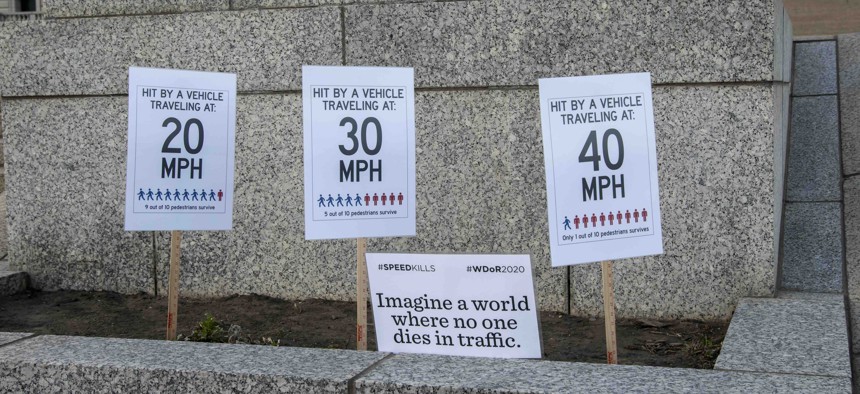Connecting state and local government leaders
The gathering marked the second anniversary of the Biden administration’s push to reduce roadway deaths. The feds also used the occasion to announce that $1.25 billion in grants is available for its Safe Streets and Roads for All program.
State and federal officials on Wednesday swapped ideas in Washington, D.C., for reducing road deaths—from beefing up speeding enforcement in work zones to building safer intersections on four-lane highways—as they look for ways to reverse the spike in fatalities that began during the early days of the pandemic.
“It's a challenging, frustrating time,” said Polly Trottenberg, the No. 2 official at the U.S. Department of Transportation and a former New York City transportation commissioner. “We had a great run in U.S. roadway safety, where for 30 years we saw fatalities decline.”
The improvements came as new safety features in vehicles like airbags were introduced, as well as policies that required drivers and passengers to wear seatbelts.
“But over the last decade, progress really stalled, and then roadway fatalities spiked during the pandemic,” Trottenberg said. “Over the past year, we’ve seen a glimmer of hope as those numbers have started to level off. But we all know we have so much work to do.”
Trottenberg hosted the gathering to mark the second anniversary of the Biden administration’s plan to improve roadway safety. The plan is based on the “safe systems” approach the airline industry has used to drastically reduce passenger deaths. The federal road safety blueprint stresses the need for “safer people, safer roads, safer vehicles, safer speeds and better post-crash care.”
The number of traffic deaths declined for six straight quarters since the plan was unveiled, according to the Transportation Department.
Nebraska Gov. Jim Pillen, a Republican who took office last year, said his state’s road deaths decreased by 5.4% between 2022 and 2023. Pillen said Nebraska has taken several practical steps to make roads safer. The state transportation department used common treatments such as cable median barriers and rumble strips on interstates. It added reflective strips to the posts of thousands of stop signs in rural parts of the state.
Plus, Nebraska has increasingly installed roundabouts and “RCUT” (restricted crossing U-turn) intersections for busy four-lane roads. RCUT designs force drivers that want to cross a divided highway to do it in multiple steps, rather than all at once. To make a left turn, for example, the motorist would first turn right onto the highway, then pull into a left turn lane to make a U-turn. The idea is to focus a driver’s attention on one direction of traffic at a time.
“We have lots of roadways that don't make sense for overpasses,” he said. “I was probably one of those who, the first time that I saw [an RCUT] said, ‘Who on earth engineered this?’ But it's extraordinary,” Pillen continued, referring to a decrease in crashes at the intersections where they were installed.
Maryland Lt. Gov. Aruna Miller said her state is updating its complete streets policy for the first time in more than a decade and revamping high-risk corridors for pedestrians.
“In 2023, more than 600 people were killed on Maryland's roadways—the highest numbers since 2007,” she said. Of those, 150 were pedestrians and 15 were cyclists. “These staggering numbers show that we must do so much more to ensure safety of our most vulnerable roadway users.”
Miller highlighted a work zone safety group that proposed changes to protect highway construction workers following a crash that killed six people last March. The lieutenant governor, a transportation engineer, led the group, which recommended in November that the state increase fines for speeding in work zones and increase the use of speed cameras in those areas to deter reckless driving. Miller asked Maryland lawmakers to approve the changes last week. She told advocates in Washington on Wednesday that the goal of the legislation is to change driver behavior.
Jim Tymon, the executive director of the American Association of State Highway and Transportation Officials, known as AASHTO, said state transportation departments have ramped up their safety efforts to address the “health crisis” of roadway deaths.
AASHTO’s board adopted a resolution in November that calls on every state to increase their rollout of proven safety measures developed by the Federal Highway Administration. The measure asks state transportation agencies to “do everything in their power to make changes, not just on the behavioral side, but also on the infrastructure side,” Tymon said. “We’re looking at how we design our nation’s transportation facilities and making sure we’re doing it with the safety of all users involved, not just drivers, but pedestrians, cyclists and transit users.”
As part of the federal push to promote road safety, 36 state and territory agencies and highway safety offices shared in a “call to action” campaign how they planned to try to improve roadway safety.
“Many states discussed a commitment to work zone and rural road safety enhancements as well as emergency notifications to alert roadway users of major incidents and weather,” the U.S. Department of Transportation said in a release. The participating states committed to working with affected groups to get ideas for improvements, as well as using data analytics on historical crash and enforcement data to “see traffic safety data in a new way.”
The states that did not participate are Alabama, Arizona, Colorado, Florida, Idaho, Indiana, Iowa, Louisiana, Maine, Nevada, New Hampshire, North Dakota, South Carolina, South Dakota, Tennessee, Texas and Vermont. Ten of those states had more traffic deaths per capita than the national average in 2021.
The federal Transportation Department also on Wednesday announced that it is accepting applications for a new round of $1.25 billion in grants through the Safe Streets and Roads for All program that cities, counties, tribes and metropolitan planning areas can use for safety related planning and projects.
Daniel C. Vock is a senior reporter for Route Fifty based in Washington, D.C.

NEXT STORY: Are the Build America rules slowing infrastructure progress?




